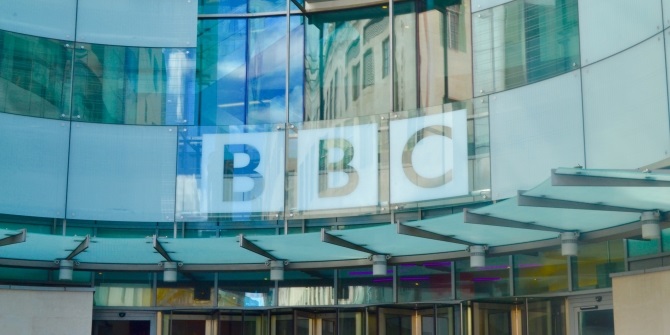How should systems that were originally set up to deal with complaints from members of the public about traditional media respond to the rise in bloggers and citizen journalists? Adeline Hulin, Project Consultant for UNESCO, reflects on the situation across Europe, and argues that existing self-regulatory media councils need to do more to incorporate new forms of journalism.
Media councils in Europe were set up primarily to deal with traditional forms of media (mainly print and sometimes broadcast), yet now all members of the Alliance of Independent Press Councils of Europe (AIPCE – a loose network of national, voluntary self-regulatory organisations set up to deal with complaints about editorial content from citizens) have extended their jurisdiction online, to online versions of traditional media outlets and, increasingly, to online-only news websites. However, in practice, online news bloggers and citizen journalists rarely sign up to the various self-regulatory systems that exist across Europe. According to information shared by AIPCE members with the author in October 2015, only two media councils (the Kosovo Press Council and the Armenian Media Ethics Observatory) have members who are individual bloggers or citizen journalists – here understood to mean those who publish online, sometimes anonymously and without prior editing or commissioning by an intermediary.
Why such a widespread absence, and why is this important?
Many media councils are receiving an increasing number of complaints from citizens about alleged breaches of journalistic ethical standards by online news blogs or citizen journalists, and there is a need for clarification regarding these new forms of journalism and the roles of media councils for readers. As can be demonstrated by the increasing complaints against these new forms of journalism (for example, that a story is inaccurate or intrudes into an individual’s privacy), readers assume that it is possible to seek redress, and that these websites are subject to the same standards as traditional media. While new technologies and social media continue to spread across the globe and become an increasing part of people’s everyday lives, it is now unrealistic for media councils to not reflect the reality of a changing media landscape.
Despite this, many media councils sideline the issue as it partly depends on how they define and deal with the tricky issue of membership. Some councils are strict about only dealing with complaints about their members: publishers, titles or sometimes individual journalists who ‘sign up’ to the rules (i.e. a code of ethics) which the councils oversee. Some councils adopt a less formal approach, and issue pronouncements about content published in non-member titles that have opted – as is their right – not to join a self-regulatory system. Accordingly, media councils that can only treat complaints about their members may simply wait until the first bloggers join their system. But clarifying the situation for readers is more urgent for those press councils that either can (or choose to) treat complaints about any media content, including that published by non-members. This is the case for the majority of media councils belonging to the AIPCE, including the councils in Austria and the Netherlands and for both the French and Flemish language councils that exist in Belgium (though not the UK). However, one leading reason given by those AIPCE councils that are able to investigate complaints about online bloggers and citizen journalists, is that they fear that this may open up a Pandora’s box in terms of the number and complexity of complaints.
There is an important difference here that gets to the crux of self-regulation: what does it mean to be a member of a media council? What are the responsibilities of a member? What sanctions can a council apply, and how do sanctions relate to membership arrangements? Media councils have different options for moving forward, depending on their complaints policy and membership rules. For councils that only handle complaints about members, a change of their membership rule to include bloggers may be a solution. So far, this change has only been enacted by a small number of councils, including in Norway. However, it is important to note that so far no blogger or individual online journalist has applied to become a member of the Norwegian press council. Among the reasons given by other councils (such as in Finland and the Netherlands) for not extending their membership, one argument is that membership to the self-regulatory body is meant for those exercising journalism as a profession, and that this distinction is insisted on according to the council’s rules.
This takes us into difficult territory about what, exactly, journalism is at the present time, and if and how it can legitimately be defined as a profession. It also illuminates some of the countless cultural and linguistic factors that determine different countries’ approaches to media self-regulation, and why it is impossible to say that there is a ‘one size fits all’ approach across Europe.
Much work needs to be done in those countries to encourage individual bloggers and citizen journalists to voluntarily apply for membership to media councils and to encourage councils to change their membership rules. By allowing new forms of journalism to become part of their system, readers would be better able to distinguish between reliable and potentially untrustworthy news online. This could also strengthen the profile of media councils and help to address the increasing number of problems that can arise online, such as copyright problems or online hate speech. (Note that the codes of ethics of different councils, whilst generally sharing a core number of themes, vary, so the precise issues under complaint vary from country to country).
For the other councils which do handle complaints about non-members, one of the main issues relates to the availability of resources. Many councils report that they do not have the necessary resources to handle complaints about an increasing number of online content and some councils confess to already being overwhelmed by complaints from citizens. In the Former Yugoslav Republic of Macedonia, for example, 78% of the complaints to the Council for Media Ethics of Macedonia concern online media. In Bosnia and Herzegovina, the Press Council received a total of 875 complaints in 2014, almost 600 of which related to content published on online news sites. Adding complaints about another new type of online journalism would be unfeasible for them. Yet, the Flemish Press Council took up that challenge, agreeing in 2015 to deal with a complaint about a consumer blog, regardless of the fact that the authors denied practising journalism or being journalists (and were not members of the council). This case raises fascinating questions of wider relevance: is it possible to practise journalism non-voluntarily (or even unconsciously), and what are the regulatory and legal implications of this? Where should a press council draw the line between journalism and communication and is there a reliable definition of each that they can rely on?
More generally, it also means that all media councils will have to update their standards for the online world. This may change their way of doing things as well. Many questions arise: is there a need to develop different ethical standards for these new forms of journalism? Can and should citizen journalists or bloggers be judged according to the same rules as other journalists?
This blog gives the views of the author and does not represent the position of the LSE Media Policy Project blog, nor of the London School of Economics and Political Science.







1 Comments